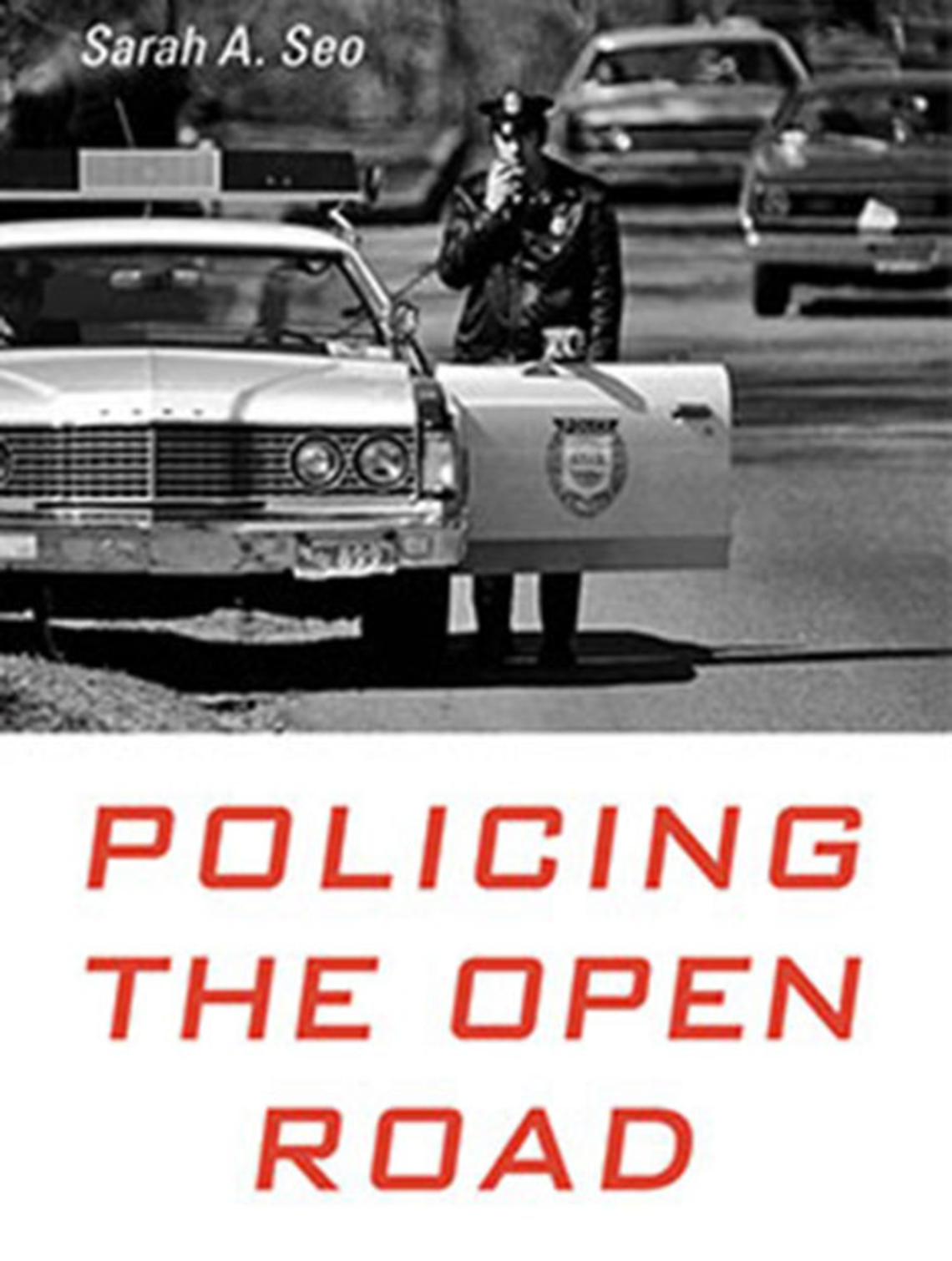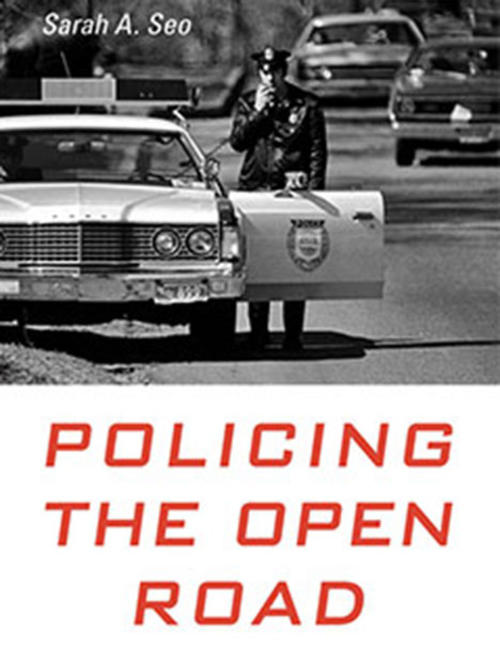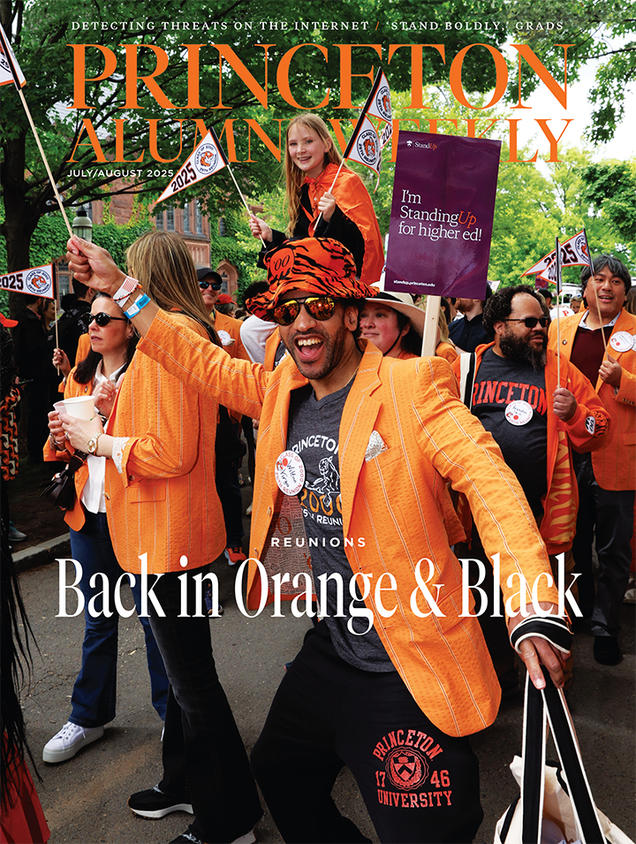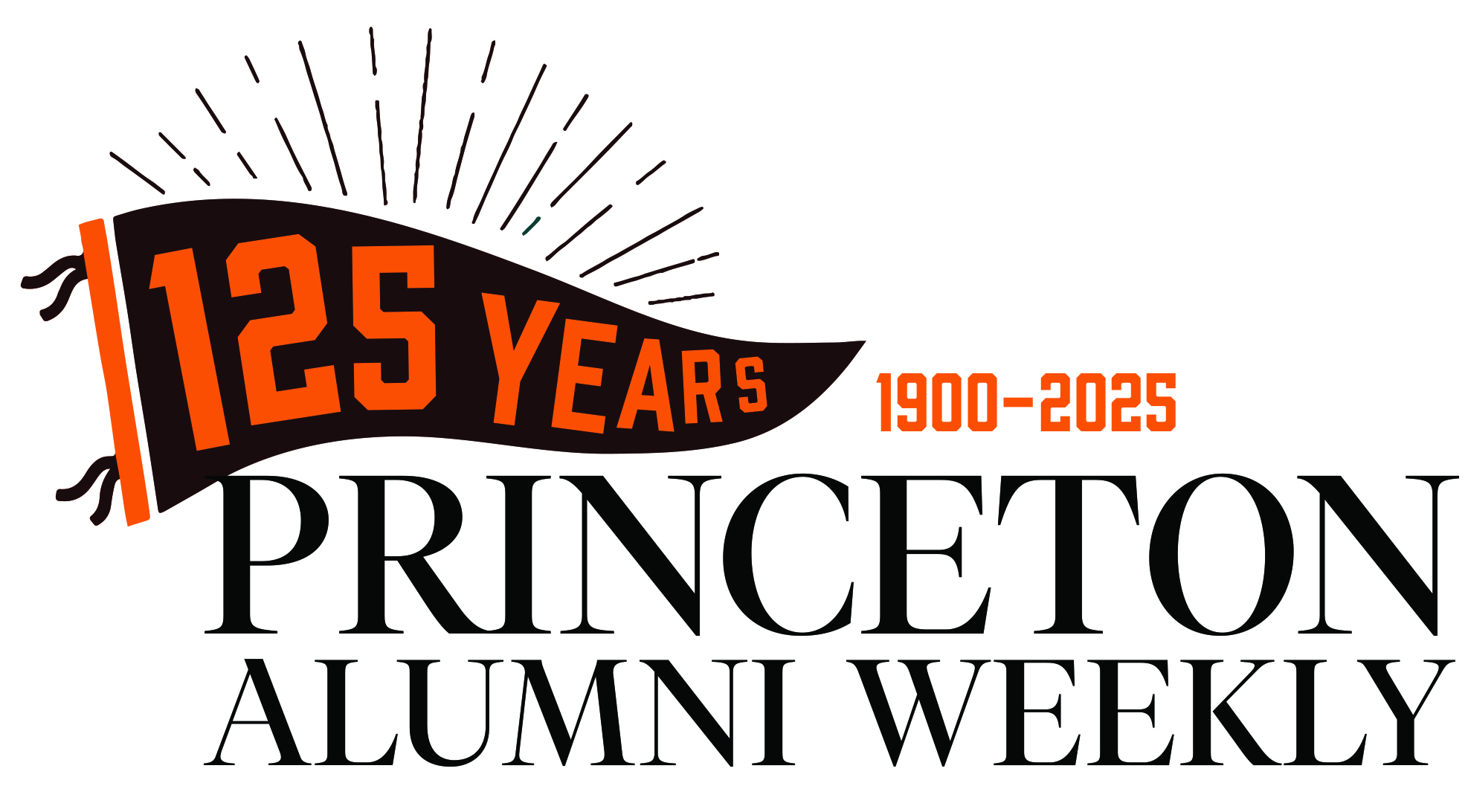

PAWcast: Sarah Seo ’02 *16 on How Cars Changed Constitutional Law
From the Fourth Amendment to discriminatory traffic stops

Listen on Apple Podcasts • Google Podcasts • Spotify • Soundcloud
TRANSCRIPT
Brett Tomlinson: Welcome to the PAWcast, a monthly podcast from the Princeton Alumni Weekly. I’m Brett Tomlinson, and our guest this time is Sarah Seo ’02 *16 a legal historian and associate professor of law at the University of Iowa. Sarah graduated from Princeton with a bachelor’s degree in history in 2002, and after studying law returned as a graduate student earning her Ph.D. in history in 2016. She is the author of a new book, Policing the Open Road: How Cars Transformed American Freedom.
Now, in popular culture the car is often a symbol of freedom. Consider all those movies and songs about the open road. But as Sarah writes, driving a car is also “the most policed aspect of everyday life.” So, we’ll be talking about the history of the automobile and its impact on the law and law enforcement in the United States. Sarah, thank you so much for joining me.
Sarah Seo: Thank you so much for having me. I’ve been looking forward to this conversation.
BT: Great. Well, I would like to start with some background on your book, which I gather draws on research that you did for your Ph.D. dissertation at Princeton. What drew you to this topic?
SS: You’re right, the book is based on my Ph.D. dissertation. I came to this topic from several avenues, most directly from my year clerking at the Southern District of New York with the Judge Denny Chin [’75], who is also a Princeton alumni. I didn’t think I would be interested in criminal law, but we have a general docket with civil cases and criminal cases. And I noticed that almost all of the criminal cases that we had were drug cases. And I was really interested in the impact of the war on drugs on American criminal justice. And so my research topic kind of grew out of wanting to know more about the history of the war on drugs. And my dissertation adviser, Dirk Hartog, kept asking me to narrow my topic. The war on drugs is a really broad topic, you can write a lot of things about it, a lot has been written about it, more can be written about it, but for a dissertation it has to be — finding a dissertation topic is kind of like navel-gazing a little bit, you kind of have to find your little area to focus on. And so, I narrowed it down to law enforcement in the war on drugs. But even that is a huge topic, so I narrowed it down even more to the Fourth Amendment. And the reason why I focused on the Fourth Amendment is because that’s the one provision in the U.S. Constitution that directly governs what the police can and cannot do. So I basically started my research reading every Fourth Amendment case from the very beginning. And there weren’t a lot of Fourth Amendment cases until the 1920s, and there was an explosion of Fourth Amendment cases then. I realized as I was reading through all of these cases one-by-one that a lot of them had to do with cars. And of course, the automotive society really grows in the 1920s. So, there was a coincidence of all of these Fourth Amendment cases questioning what the police can and cannot do with the mass production and adoption of cars in American society.
BT: And the history is just so interesting. I mean, the arrival of the automobile led to these really profound changes in American life and policing is included in that for some very good reasons. You write about the aggressive or careless drivers who were causing this remarkable number of accidents — often fatal. How did cities and towns respond to this public-safety, public-health crisis of so many cars on the road?
SS: What they immediately began doing was creating more laws. All these rules and regulations governing how someone could operate their cars on public roads, for public safety. The accident rate skyrocketed; children were dying on the street. Pedestrians were being hit with cars while walking on the sidewalks. And so cities and towns throughout the United States passed a lot of laws — the traffic code, basically. And they ran into a problem: They didn’t have the law enforcement to make sure that drivers obeyed the traffic code. Everybody kept violating the traffic laws. Still true today, right? Everybody who gets behind a car is guilty of [violating] some traffic law, whether it’s speeding or turning without a signal light, and that was — that was true when cars first appeared on the road. Except the difference then weren’t police departments and police officers who could enforce all of these traffic laws. And so, I argue in the book that really, modern policing grew because of the need to discipline the drivers. The early adopters of the automobile who were the quote-unquote “everyman,” the average middle-class white American.
BT: And you write that this is something new, the relatively well-off or the middle-class Americans might not have had that many interactions with police before the traffic laws became so prominent.
SS: Yeah, and this was a huge change. So American society is going through a lot of changes in the 1920s and this is one of them. The cars are surely changing American society. So, expectations of privacy, including how couples, young couples, courted changed, right? They were now going on intimate drives. So American society changed, American culture changed. And also, what you pointed out, the way that the well-to-do, everyman American and how they interacted with the state changed too.
Before cars, the way that laws and norms were enforced for the respectable middle-class person was through the associational groups — through trade associations, through churches, through fraternal organizations, through trade groups, they all regulated how people behaved towards one another. If those norms broke down, then they sued each other in court — they brought lawsuits against each other. There were police officers, of course, even before cars. But police officers mainly disciplined those on the margins of society. There’s a lot of history written about how law enforcement agencies disciplined immigrants, they disciplined racial minorities, foreigners. But the interactions between law-enforcement agencies and officers and the middle-class, respectable Americans — that was really foreign until the 1920s, when people started confronting police officers in their cars. And this had a huge effect not just on the relationship of citizens and police officers but also the Fourth Amendment.
BT: And the vast expansion of cars on the road also coincides with Prohibition and the illicit liquor trade, which I gather leads to the first automobile case that reaches the Supreme Court. Can you tell me a bit about Carroll vs. the United States and how that sort of set the tone for how cars would be viewed by the courts?
SS: Sure. So, Carroll vs. the United States actually first appeared before the court in 1923, but for some reason the Court wanted to hear argument again in 1924 and then the decision came out in 1925. And so, already from the early 1920s, the issue made its way all the way up to the U.S. Supreme Court. And the issue is whether the police need a warrant to stop and search a car. And this was a huge issue because under the common law that existed before cars the answer should have been yes, officers do need a warrant because a car is an effect. The Fourth Amendment protects people and their houses, and papers, and effects. Effect is another word for movable things, and a car is obviously a movable thing. And so, under the common law an officer needed a warrant to stop and search a car.
But there was a problem with cars: Cars were easily mobile. People could get in a car and drive off at any time they wanted to. There were no set schedules [as there were] for the trolley train, no set schedules for the railroad car that they had to follow; anybody could drive off and at high speeds, too. And so, officers couldn’t get a warrant in time. And so, this posed really huge obstacles for law enforcement. They couldn’t get a warrant in time to stop someone that they thought might be transporting alcohol in their cars.
And so, the court had faced this quandary. Requiring a warrant would prohibit law enforcement during Prohibition. But at the same time these established common law principles that interpreted the Fourth Amendment dictated that officers needed to get a warrant for cars. So, what did the Supreme Court do? They completely changed the common law. They said that an officer does not need a warrant to stop and search a car if the officer has reasonable or probable cause that there’s contraband inside. This is a huge transformation, because for the very first time the court authorized an officer to decide for him or herself — back in the 1920s it’s probably himself — for the very first time an officer could decide for himself whether he had probable or reasonable cause to stop and search a car. Rather than going to a judge and a judge deciding whether there was probable cause or not. And so, basically moving the decision from the judge to the officer really enhanced the power of officers on the road, and we’re seeing the ramifications of that up to today.
BT: So legally your car is treated very differently than, say, your house would be treated in terms of the right of privacy or protection from search.
SS: Exactly.
BT: What are the consequences of that view, both — the intended consequence I gather is that it does allow for some degree of effective policing, but what are sort of the unintended consequences of that broad discretion?
SS: Well, one unintended consequence, and what I was referring to in my last answer to you as the consequences that we see today, is “driving while black.” The problem of racialized policing on the road that we see today is a product of this history.
The home is the most protected private sphere in American constitutional law. And Supreme Courts’ opinion will say in a car an individual has a lesser expectation of privacy, but really when you look at all the court decisions that have flushed out exactly the police can and cannot do with respect to a car and a driver, there’s really no privacy rights at all in a car. When a police officer stops somebody for a minor traffic violation today, during that traffic stop, the Fourth Amendment starts allowing the officer to investigate further if the officer has a hunch or a suspicion that there might be more in the car. For minority drivers that often can result in a search of the entire car, even if that person is innocent. For the everyman driver today, the middle-class, non-minority driver, an officer usually doesn’t proceed that far in terms of searching a car. But it is true for minority drivers. And if you look at the statistics of how many minority drivers are pulled over, searched, and then if you look at also statistics of police traffic stops that have gone really badly — ended up with police shootings — about a third of police shootings occur during a traffic stop. And so, the power that police have over cars and their drivers has grown tremendously in the 20th century and that all started with the Supreme Court case Carroll vs. the United States.
BT: And subsequent cases — automobile cases that include kind of the Fourth Amendment issues have definitely reinforced this, right? This is not something that’s kind of retreated at all over the years?
SS: Right. It’s just really, it’s — the police’s powers over drivers and their cars have grown through the 20th century. They’ve added and built on each other, and I can mention several important milestones in this history, but the police’s power has grown. And the reason why, as I explained in my book, is that once you give the police discretionary power, which Carroll vs. the United States did, it’s really hard to draw a bright line on what the police can and cannot do. And, so, what the courts have done is to say, well, the Fourth Amendment used to say for private property, for houses and effects, we require a warrant, but now when it comes to cars all we require is that the police be reasonable. And in these Fourth Amendment cases, usually a judge is looking at a guilty defendant — the officer found something in the car. And the defendant is challenging what the police did, and it’s really hard for a judge to say, after the fact, well, the police found something and it’s really hard to say that what the police did was unreasonable. So over time you have these court decisions saying what the police did was reasonable in cases where the driver was actually guilty. What the judges don’t see are the cases where drivers are innocent. And so you get Fourth Amendment jurisprudence decided over the 20th century in cases where the defendants are guilty and judges are inclined to give the police more leeway.
BT: So in your book you feature some of the interesting characters who influence policing in the 20th century. I’m thinking first of August Vollmer. How did he shape the modern police force, and what was his role in that?
SS: Well, August Vollmer was the Police Chief of the Berkeley [Calif.] Police Department from 1905 to 1932, and he’s called the Father of Modern Policing. He is — he was the leading reformer to get the police modernized and professionalized. He wanted the police profession to be a field like lawyers, engineering, and teachers, where only people who had degrees and specialized training could become law officers. And, he really did not want the police to handle traffic cases, because in his mind policing was a profession that dealt with crime fighting. But he accepted the fact that traffic law enforcement was one of the duties that officers had to do. So, he played an important role in trying to professionalize traffic law enforcement and general policing overall in the United States.
BT: In the area of sort of pushing back against police practices and protecting the right to privacy, you also tell the story of Charles Reich, a law professor at Yale. What was the impact of his work, and could you tell me just briefly a bit about the research and writing that he did?
SS: Right, so one thing I’ll mention is that Professor Reich just passed away this summer. And so, it was almost the end of an era in terms of looking back at the impact of his scholarship, which was very tremendous. So, let me start by explaining what his biggest contribution to legal scholarship was. He wrote this ground-breaking article called “The New Public,” where he argued that the government basically distributed almost all the wealth in this country. It used to be private property that was the basis of wealth and a person’s privacy rights against the state, but now in the modern state where the government doles out welfare benefits, licenses, government contracts, almost everybody had kind of what he called a feudal relationship with the state. And the implication of that, he said, was that the government had increasing power over individuals. And so he argued in this ground-breaking article, that the welfare beneficiaries should be able to claim due-process property rights in their benefits from states. The reason why I talk about this in my book about cars, is because he — in his paper about the new property, the car was everywhere in that article. And I think what he was trying to do in that article, was to say to you, everyman, respectable, white American, you might think that this argument about welfare benefits is about poor people, but it affects you, too. Because everybody has a license from the state — that license is a driver’s license. So, everybody is beholden to the state, at least on the road. Because in order for you to drive the state has to give you permission in the form of a driver’s license. And with that relationship the state has a lot of power over you. And this is what we were talking about at the beginning of this interview, how much power the state has because we live in a car society. It’s the most policed aspect of everyday lives, and Reich was trying to argue that everybody was beholden to the state because we live in a car society.
BT: And — you’ve traced — I mean, this is really a history of more than a century that leads up to the present day that continues to be a major issue, policing the roads. Do you see potential legal remedies that could make the encounters between police and the public safer, and more just, within the framework of what’s been established in terms of Fourth Amendment jurisprudence?
SS: You asked the million-dollar question, which is: What can be done? And let me answer that question by going back to Charles Reich. So, he saw the state’s power over individuals, everybody in the country because of the relationship between drivers and the state. And he was, in particular, very cognizant of the dangers to individual privacy rights because of that relationship of the government regulating drivers and driving. He wrote these articles in the ’60s, early ’70s. He was a closeted gay man during this time and he felt stifled by suburbia, domesticity, and to basically escape that feeling of being stifled he went out for drives by himself, long drives — he loved to drive. And he got pulled over a lot, and he didn’t know why. He asked one officer, “Why are you pulling me over?” And the officer basically told him, “I can do that whenever I want to, you can’t do anything about it.” And so, whenever he got pulled over and an officer asked him, “Where are you going, where are you coming from?” these are really intrusive questions for somebody who was a closeted gay man who was trying to escape the oppression of suburbia by driving, right? And so, for him, the police officer being able to stop him in a car and asking about his whereabouts — he wanted to figure out a way to protect himself, to protect his privacy from the police. And he wrote an article about this, what can be done to protect what he called, “law-abiding citizens in their cars.” And he was referring to himself as the law-abiding citizen. What could be done to protect people like him? And the eye-opening thing was he really didn’t have a solution. He went back to the 1925 case, Carroll vs. the United States, actually. He said, we need some more rights, and what could those rights be? Well, before the police can stop you and ask you questions they really need to have a good reason — probable cause. That’s the Carroll decision right there. And so this goes back to what I was saying earlier. Once the law gives the police discretion to enforce the laws on the road, and even before that, even before the law gives that power, when American society decides that we’re going to rely on police officers to maintain order, to fight crime, and that those tasks require discretion and proactive action on the part of the police, it’s really hard to draw a bright line on what the police can and cannot do.
And so, what is to be done? Charles Reich didn’t really have an answer for what is to be done. The answer today might be, actually, if it’s really hard to draw a bright line about what the police can and cannot do, maybe we should start drawing bright lines. And maybe those bright lines can be decriminalization. Because once you say certain things won’t be criminalized then that takes away an area for the police to police and exercise discretionary power over. So, these are some of the questions — your million-dollar questions. These are the things that I’m still grappling with right now in my role as a law professor and legal scholar. My hat as a historian is written in the book. These are really hard issues that law professors are still grappling with.
BT: This is a — it’s not just a historical issue it’s very much a policy issue today. Something that deserves more exploration.
Sarah, I wanted to ask you about your background, your Princeton experience, because I gather you didn’t take the typical path into academia. You graduated, went to law school, did clerkships in the federal courts. What made you decide to come back to the history department for your Ph.D. studies, and what has your path been since beginning graduate school?
SS: I’ve always loved history as a child, especially biographies. I loved reading about people. One of my earliest memories — not earliest — a memory around junior high school was reading a biography of Eleanor Roosevelt. And calling the UN after finishing the book, calling the UN and asking for an internship. I’ve always been drawn to meeting people, also, because the love of history has always been there. And, I went to Princeton as an undergrad, majored in history and I did two certificates. Back then it was called women’s studies, actually it’s called gender and sexuality. But I did a certificate in women’s studies and a certificate in East Asian studies, and my senior thesis was on the history of the Korean comfort women movement. And Princeton was generous enough to fund my research, which allowed me to go to Korea to interview the activists in that comfort women movement, to help the sex slaves of the Japanese military during World War II gain redress for what they experienced. And, in my interviews with these activists, a lot of them were lawyers. And this was really the first — OK, this was the second time I interacted with lawyers; the first time was our immigration lawyer when I was in high school. But this was the first time I had really talked to lawyers, and I was really inspired by what they were doing. And so, I kind of had this decision after graduating from undergrad. Do I want to be a lawyer, a human-rights lawyer, or do I want to pursue history further as a profession?
Well, I decided to go to law school. And even in law school I was both really interested in law but also really interested in history. And I told myself, I’ll spend my clerkship years figuring that out. And some mentors in law school convinced me that I could do both law and history and pursue human rights all at the same time. And so, I decided to go to graduate school. And the specific question of why Princeton is because Princeton had Dirk Hartog on the faculty, and he is widely considered the person to study legal history with. He just retired this year, which is a passing of an era, but when Dirk called me to say that I got in for the Ph.D. program, I knew that I didn’t need to look anywhere else. That was where I wanted to be.
BT: Well, it seems like you have made a good choice. The book is a very interesting read, and I appreciate you taking the time to speak with me. It’s been very interesting.
SS: Thank you so much, I really enjoyed talking to you. You know, the best thing for a writer is to have somebody to read her book. You’ve paid me the highest compliment.
BT: Well thank you.
Sarah Seo is the author of Policing the Open Road: How Cars Transformed American Freedom. Published by Harvard University Press. If you’ve enjoyed this podcast please subscribe, you can find us by searching for Princeton Alumni Weekly on Apple Podcast, Spotify, and Sound Cloud. And transcripts of every PAWcast are available on our website, paw.princeton.edu.
This episode was recorded at the Princeton Broadcast Studio with help from Daniel Kearns, the music is licensed from FirstCom music.
Paw in print

July 2025
On the cover: Wilton Virgo ’00 and his classmates celebrate during the P-rade.


0 Responses